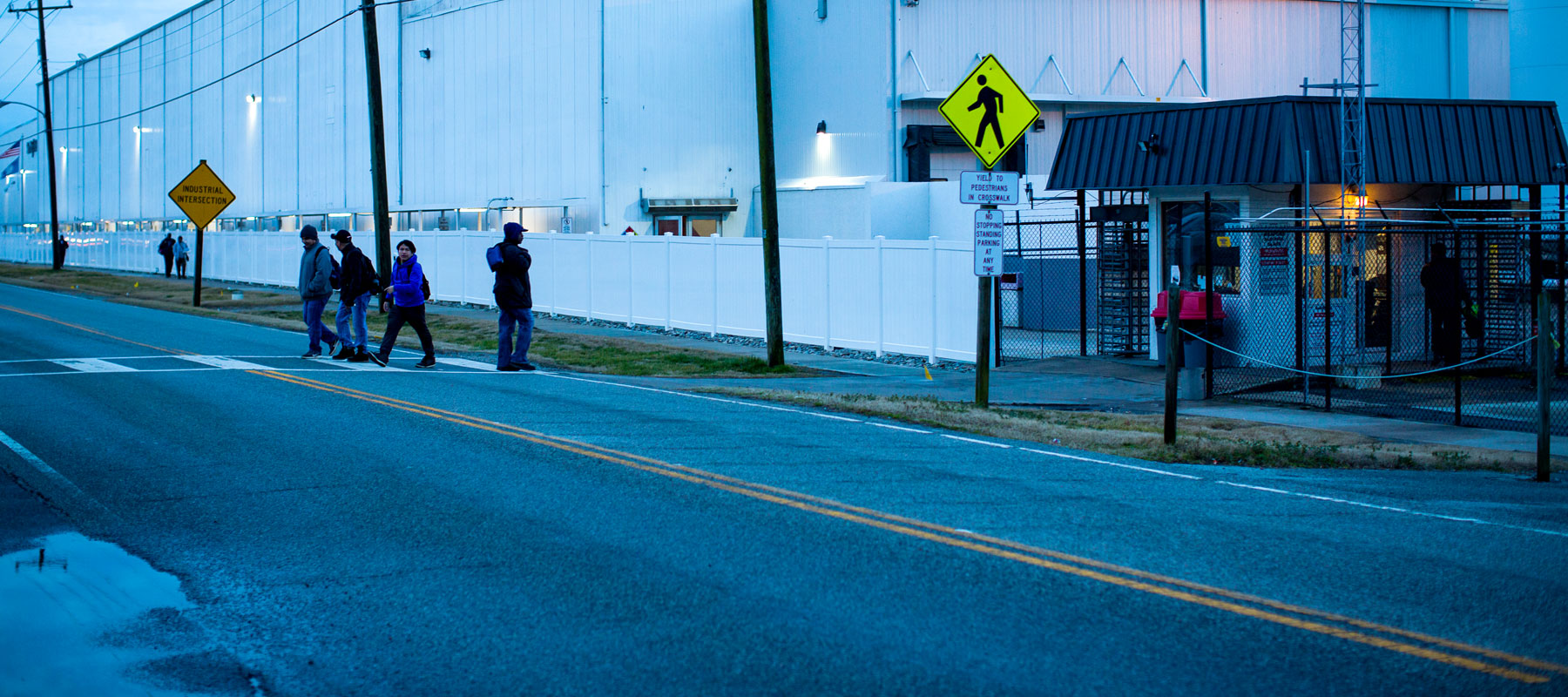
Workers at the plant cross the street during a 7 a.m. shift change on February 13. Photos by Daytona Lamade

Share
Excerpted with permission from In These Times magazine
In late May 2018, nine women sued Smithfield Foods, the largest pork processor in the world. Several of the lawsuits charged that plant supervisors had engaged in “the most extreme acts of sexual harassment.”
The women worked in the retail bacon division, the microwave bacon department and the kill floor. They alleged that, for years, supervisors brushed their genitals against them and grabbed their breasts and buttocks; promised a promotion and even a “cheap car” in exchange for sexual liaisons; and prodded the women for sexual favors such as fellatio and a lap dance.
One worker, Marquesses Foreman, alleged she was harassed on a weekly basis for more than a year, between 2014 and 2016, and that her supervisor showed her a photo of his penis, hit her with rolled-up paper and touched her breasts. He allegedly told Foreman, who is black, that he should fire all of the black workers and replace them with Mexicans who “could get the job done for less pay.”
Four of the women claimed HR reduced their hours after they reported harassment. Foreman allegedly lost 20 percent of her income from the reduced schedule.
Three of the women claim they were fired after reporting harassment.
Like most other sexual harassment lawsuits filed under Title VII of the 1964 Civil Rights Act, these lawsuits never came before a jury. The nine women resolved their complaints with Smithfield outside of court—a route often pursued by large corporations to avoid negative publicity. No settlement amount was disclosed.
The women and their lawyers did not respond to In These Times’ interview requests, but 12 current and former Smithfield workers from two of the largest plants in the Southeast agreed to talk. The workers—women and men—ranged in age from 25 to 67.
Ten of the 12 said they had either experienced, witnessed or were aware of line supervisors perpetuating a toxic culture of harassment, including sexual comments, unwanted touching, coercion, retaliation or favoritism. Many workers interviewed believed complaining to the company would be useless. Management, they said, valued supervisors who could meet high production quotas, regardless of how they treated workers.
Asked about allegations of sexual harassment, Smithfield’s executive vice president of corporate affairs and compliance, Keira Lombardo, pointed to Smithfield’s code of business ethics, which promises “the right to work free from harassment” including sexual advances and slurs.
“Each and every employee has pledged to uphold these standards upon joining the company, and violations of these standards are unacceptable and immediately dealt with,” wrote Lombardo. “We also provide employees with methods to report ethics concerns or violations, which are reviewed, investigated and responded to accordingly.”
But experts say that, across all industries, workers tend to stay silent about sexual harassment because the risks of reporting often outweigh the benefits. The Equal Employment Opportunity Commission (EEOC) estimates that three out of four women who speak out about sexual harassment at work face punishment. According to Bernice Yeung, author of In a Day’s Work: The Fight to End Sexual Violence Against America’s Most Vulnerable Workers, workers like those in the meatpacking industry, who are disproportionately immigrants and tend to work for subsistence wages, are especially unlikely to report.
Read the rest of this story at InTheseTimes.com.
This investigation was supported by the Leonard C. Goodman Institute for Investigative Reporting.
Lauren Kaori Gurley is a staff writer at VICE’s Motherboard on the labor beat. She is a former contributing writer to Rural America In These Times and In These Times intern. You can follow her on Twitter @laurenkgurley.

